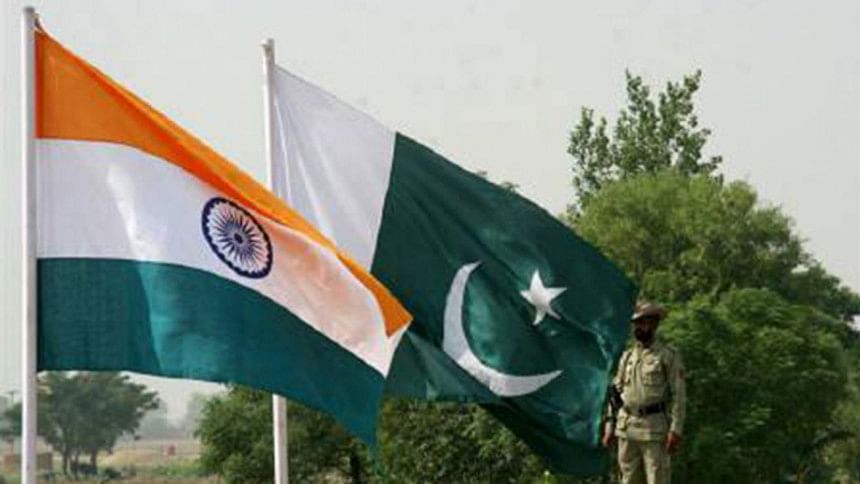Response to J&K Terror Attack: India gives forces ‘operational freedom’

Indian Prime Minister Narendra Modi has given the country's military "operational freedom" to respond to a deadly attack in Kashmir last week, a senior government source told AFP yesterday, after New Delhi blamed it on arch-rival Pakistan.
A week after the deadliest attack on civilians in the contested region in years, Modi yesterday held a closed-door meeting with army and security chiefs, during which he told the armed forces that they had the "complete operational freedom to decide on the mode, targets and timing of our response to the terror attack", said the government source, who was not authorised to speak to the media.
The development came after Pakistan's defence minister said a military incursion by neighbouring India was imminent.
"We have reinforced our forces because it is something which is imminent now. So in that situation, some strategic decisions have to be taken, so those decisions have been taken," Defence Minister Khawaja Muhammad Asif told Reuters in an interview at his office in Islamabad on Monday.
Yesterday, New Delhi released video images of a stern-faced Modi meeting with army chiefs, as well as Defence Minister Rajnath Singh and National Security Adviser Ajit Doval.
"It is our national resolve to deal a crushing blow to terrorism," Modi said, adding that he has complete faith and confidence in the professional abilities of the Indian Armed Forces.
Earlier in the day, Indian Home Secretary Govind Mohan chaired a high-level meeting with the chiefs of three paramilitary forces and senior officers of other security organisations.
Sources said a meeting of the Cabinet Committee on Security and Political and Economic Affairs will be held, possibly today.
After the terror attack, Modi vowed to pursue the terrorists behind the attack and their patrons to the "ends of the earth" and inflict the harshest punishment on them.
Relations between the nuclear-armed neighbours have plummeted after India accused Pakistan of backing an attack in Indian-administered Kashmir on April 22 in which 26 men were killed.
Islamabad has denied any role and called for a neutral investigation. Both countries have since exchanged gunfire in Kashmir, diplomatic barbs, expelled citizens and ordered the border shut.
Yesterday, the Indian army said that both sides exchanged fire for a fifth straight night along the Line of Control (LoC), a heavily fortified zone of high-altitude Himalayan outposts.
There was no immediate confirmation from Pakistan on the exchange of fire, but state broadcaster Radio Pakistan reported that the military had shot down an Indian "quadcopter", calling it a violation of its airspace.
The unmanned Indian aircraft had attempted to conduct surveillance along the LoC in the Manawar Sector of the Bhimber area, the Radio Pakistan report said.
It did not say when the incident happened. There was no comment from New Delhi.
Analysts say they fear bellicose statements will escalate into possible military action.
During his interview with Reuters, Asif said India's rhetoric was ramping up and that Pakistan's military had briefed the government on the possibility of an Indian attack. He did not go into further details on his reasons for thinking an incursion was imminent.
He said, although Pakistan was on high alert, it would only use its nuclear weapons if "there is a direct threat to our existence".
Meanwhile, Aqeel Malik, Pakistan's minister of state for law and justice, said Islamabad is preparing international legal action over India's suspension of the Indus water-sharing treaty.
He told Reuters late on Monday that Islamabad was working on plans for at least three different legal options, including raising the issue at the World Bank, the treaty's facilitator.
It was also considering taking action at the Permanent Court of Arbitration or at the International Court of Justice in the Hague where it could allege that India has violated the 1960 Vienna Convention on the Law of Treaties, he said.
India last week suspended the World Bank-mediated Indus Waters Treaty of 1960 after the attack in Kashmir, saying it would last until "Pakistan credibly and irrevocably abjures its support for cross-border terrorism".
The bellicose statements have prompted worries of a rapid spiral into military action, with several nations, including neighbouring China, calling for restraint and dialogue.
UN Secretary-General Antonio Guterres yesterday held calls with Pakistan's prime minister and India's foreign minister to express "deep concern at rising tensions", his spokesman said.
The United Nations chief "underscored the need to avoid a confrontation that could result in tragic consequences. He offered his Good Offices to support de-escalation efforts," spokesman Stephane Dujarric said.
During the call, Pakistan's Prime Minister Shehbaz Sharif urged the UN chief to "counsel India" to exercise restraint, his office said.
Iran has already offered to mediate, and Saudi Arabia has said Riyadh was trying to "prevent an escalation".
US President Donald Trump downplayed tensions, saying on Friday the dispute will get "figured out, one way or another".
Meanwhile, the government of India's Jammu and Kashmir territory has decided to shut 48 of the 87 tourist destinations in Kashmir and enhanced security at the remaining ones, according to a government document reviewed by Reuters.
Indian police have issued wanted posters for three men -- two Pakistanis and an Indian -- who they say are members of the Pakistan-based Lashkar-e-Taiba group, a UN-designated terrorist organisation.

 For all latest news, follow The Daily Star's Google News channel.
For all latest news, follow The Daily Star's Google News channel. 



Comments